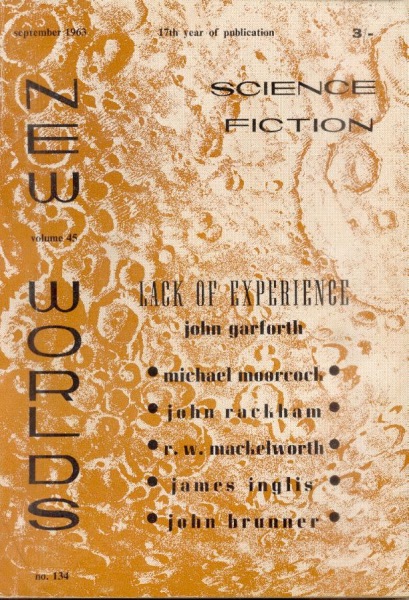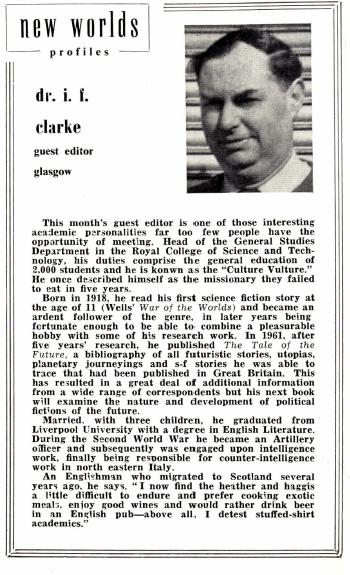
by Mark Yon
Hello again. September means that we get to Autumn, which is perhaps my favourite time of the year. The nights are getting colder and darker and the lure of a warm home with a good book or magazine grows ever more favorable.
Outside the house (when I do venture outside!) those mop-top-lets, The Beatles, are still taking the pop music world by storm. They are on tour in Britain and filling their venues as they go. Their latest recording is an EP of their hits so far – From Me to You, Please Please Me and Love Me Do, with a B-side track, Thank You Girl.

Even though this is really a re-release, “by popular demand,” as they say, like all their other releases I suspect that this one will go to the top of the British pop charts. Their upbeat energy and enthusiasm is quite infectious.
Movie-wise, I have been to see Alfred Hitchcock’s The Birds, which finally got to Britain this month. I thought it was good. There are some chilling scenes in the movie, although on the whole I felt that it’s more of a slow burn of a movie than Psycho ever was. The creepiest thing, that I realised after seeing the film, was that there is no reason given for the bird’s unusual behaviour. It just happens, which means that it could happen to you or me: anytime, anywhere.

Perhaps the most exciting news to me is the announcement made by Mr. Kennedy a couple of days ago that there should be a joint Soviet-US mission to the Moon. Being a positively minded sort of chap, I’m thinking, “Wouldn’t that be a wonderful development?” I find it hard to imagine that such a positive comment for exploration could be made less than a year after the Cuban Crisis. I guess the opposite view is that the US government may be worried about how much progress the Russians seem to be making?
On science-fictional matters, last month I did say that I would pass comment on the Hugo Awards. It sounds like it was a good time with the Good Doctor Asimov in charge of proceedings. I’ll mention him again later.
My Hugo predictions were, as I rather expected, a little off. I was disappointed, though not surprised, that the novel The Man in the High Castle won, though I have yet to actually read it myself. Well done also to Galaxy and Mr. Jack Vance for The Dragon Masters which I was pleased with. It was one of my favourite novellas last year. I was very surprised on there being “No Award” for Dramatic Presentation. Was The Twilight Zone, my prediction for winning, really that bad?
I’ll try again next year.
Right – to this month’s New Worlds.

After a couple of variable, though stronger issues, this month we seem to be back to our usual standard.
s.x, s-f and c_________p, by Mr. G.H. Doherty
No, that title’s not a misprint- that’s how it’s written. This month’s Guest Editor is someone unknown to me. However, the matter he discusses is a topical one – how does and should science fiction tackle sex in its fiction? There is a long history of the topic in s-f being avoided or ignored, partly because the fiction has grown up from the pulps and partly because its typical matters of science and technology do not lend themselves easily to the issue.
Mr. Doherty’s Editorial is part Convention Report and part-thought-experiment, in that the issue was raised by a presentation from Mr. Harry Harrison at this year’s BSFA Convention. What was meant to be a slightly humorous talk ended up as something more serious. There’s some very interesting comments made by the participants and this leads Mr. Doherty to conclude that if the genre is to make progress then it needs a more grown-up attitude. It’s not quite a return to the ranty tirades of old Editorials, but it is more anecdotal than analytical.
To the lower-cased-titled stories! (Yes, it’s still annoying.)
man-hunt , by Mr. John Rackham
This month’s Rackham story is more traditional than his recent “X-person” stories, a Galactic Police detective tale that wouldn’t be that amiss from the 1940’s pulps. Combining a man-hunt adventure with a healthy dose of Galactic Empire order, it is a story of a competent cop who meets and is tested by senior management. It is good fun. There’s a bit of ruminating about the characteristics you need to be a person with great powers and responsibility, and how sometimes meeting your heroes is not always a good thing, but nothing really new here. 3 out of 5.
breakdown , by Ms. Hilary Bailey
This story is written by – gasp – a woman! It is good to see a change in this male-dominated magazine. A sign of the times, perhaps. It’s not really a coincidence, though. Ms. Bailey is a friend of Mr. Michael Moorcock, which might explain the connection. As a social-science story, it is OK. The characters visit Neurodram Park, a place where visitors can watch others placed there for cathartic therapy by the Welfare State. This story is really about the voyeuristic attractiveness of watching other’s lives (I’m sure television scratches the same itch) and the need for people to let off steam. Shows us that perhaps we’ve not come that far from Bedlam Asylum of the 1800’s, where members of the public could watch patients. As stories based around an idea go, its OK. It made me think of the dystopian tales that Mr. J. G. Ballard does well, but without the cutting bite of his prose. 3 out of 5.
forty years on , by E. R. James
A time travel story of sorts, although really it is the sort of time travel tale typified by stories like Mr. H. G. Wells’ The Sleeper Wakes. Space miner Greg Dormer finds himself waking from cryogenic sleep forty years on than he expected to be. Seen by some as a hero, with his own Fan Club, in hospital he discovers that he is actually a suspect being investigated for the destruction of his original spaceship and the loss of the rest of the crew. This is a solid enough tale of wish-fulfilment and space piracy. It reads well enough, though the motive for the crime at the end I found a little unconvincing. 3 out of 5.
project 13013 , by Mr. Bill Spencer
Last seen in the July 1963 edition of New Worlds, with The Nothing, Mr. Spencer’s story this month is a run-of-the-mill laboratory tale. This time the drug being trialled is an attempt to achieve life longevity, with (surprise surprise!) its testing having unfortunate side effects. Ho-hum. 3 out of 5.
yutsy brown , by Mr. Pino Puggioni
Here’s something we haven’t seen for a while in New Worlds: a reprint, from a story first published in the author’s native Italian in August of this year. It is clearly part of Mr. Carnell’s commitment to publishing s-f beyond the traditional British and US markets. Others might say, uncharitably, that it is a money-saving effort. Nevertheless, the story is a jaunty tale of the eponymous author of the future meeting one of his harshest literary critics – a publishing machine! yutsy brown is entertaining and not-too-serious, which brought a certain degree of lighter relief to the issue. At the same time it also raises the sobering point that literary criticism is entirely subjective, something I must always bear in mind! In the end it was one of the issue’s stronger stories for me, which, considering my usual low opinion of ‘funny stories’, was a surprise. I must be mellowing. 4 out of 5.

To Conquer Chaos (Part 3 of 3), by Mr. John Brunner.
In the final third part of this serial we find things pretty much tied up. Much of this portion is about the joining-up of the two halves of the plot, when Idle Conrad and Jervis Yanderman meet Nestermay and her grandfather inside the dome of the barrenland. The purpose of the dome is revealed, as is the cause of Conrad’s visions. The general feel is that the story’s a little unbalanced, with a lot being revealed through information-dump in the last few pages. Much of the dialogue goes along the lines of “I don’t know why, you’ll just have to trust me,” which is rather depressingly convenient. Nevertheless, the novel’s been worth a read and it is still one of the most memorable serials of late. It shows what you can get when you get work from an experienced writer. 4 out of 5.

book reviews , by Mr Leslie Flood.
Most highly recommended this month is Mr. Kurt Vonnegut’s Cat’s Cradle, which I guess should not be a surprise judging by the comments from your side of the Atlantic. Plaudits also for Mr. Brian Aldiss’s “qualitatively erratic and erotic” The Airs of Earth but Mr. Frederik Pohl’s “failed experiment” The Expert Dreamers is less successful. Worst of all, Mr. Derek Ingrey’s Pig on a Lead is reviewed as “the strangest and most sickeningly desolate (novel), both physically and spiritually” read recently by Mr. Flood. A reason to rush out to your nearest bookshop if ever you needed one.
Personally, I really want a copy of Mr. Isaac Asimov’s anthology of The Hugo Winners, all the novelette and short story winners from Mr. Walter M. Miller’s The Darfsteller in 1955 to Mr. Poul Anderson’s The Longest Voyage in 1961. I have read most of them already, but it is great value.
***
In summary, I’m pleased that this was a fairly solid issue of New Worlds this month. The serial was good, and the reprint of a non-English story has given life to an issue that otherwise would be a little mundane, even with an editorial that discusses the ever-controversial issue of sex in s-f.
Until next month.

![[September 27, 1963] Beatles, Birds and Brunner (<i>New Worlds</i>, October 1963)](https://i0.wp.com/galacticjourney.org/wordpress/wp-content/uploads/2018/09/630927cover.jpg?resize=672%2C372)

![[August 27, 1963] Ups and Downs #2 <i>New Worlds, September 1963</i>](https://i0.wp.com/galacticjourney.org/wordpress/wp-content/uploads/2018/08/630827cover.jpg?resize=409%2C372)




